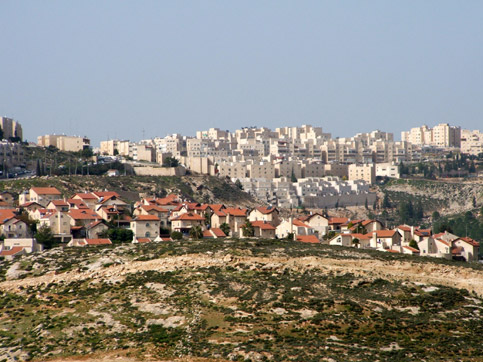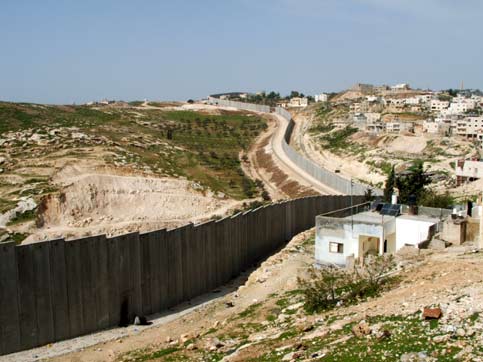 |
| The Israeli settlement
Pisgat Zeev seen from the Palestinian village Hizma. (Maureen Clare
Murphy) |
In short, the Court made clear that
the construction of the Wall and the settlements were illegal. Israel should not
only immediately stop with its construction, but also begin dismantling them and
to pay reparations to those who had lost their property as the result of the
Wall’s construction.
The Court furthermore declared that Israel stop its
violations of international law, which includes human rights and humanitarian
law violations against Palestinians in the Occupied Territories.
Consequences for The Netherlands?
But, the Court did not stop at
Israel’s obligations. An overwhelming majority of the Court concluded that all
states were obliged not to recognize the illegal situation Israel has created
and to refrain from any financial support to Israel in maintaining the illegally
constructed wall.
The Court also pointed out that signatories to the
Geneva Conventions of 1949 (including The Netherlands) had “additional
obligations to ensure Israel’s compliance” with the Conventions. Finally, the
Court declared that United Nations General Assembly and Security Council ought
to “consider further actions” against Israel to bring an end to the “illegal
situation”.
What has been the response so far?
Throughout the
Advisory Opinion, references were made to breaches of international instruments
that organisations such as Amnesty International and Human Rights Watch have
been raising for years. These all point to Israel’s persistent violations of
international law, which these same human rights organisations have since
reaffirmed. The reaction of the international community has been more
muted.
While Israel’s violations have continued to be raised, mainly in
the United Nations, powerful governments have only issued private protests, if
at all. There has been an obvious reluctance to openly and strongly condemn
Israel’s violations of international law.
Secondly, there have been
several fact-finding missions undertaken by, amongst others, Professor John
Dugard of Leiden University. Dugard has been designated by the UN as Special
Rapporteur on the situation of human rights in the Palestinian Territories; each
of his reports, the last one issued in March 2005, have amounted to strong
indictments of Israel’s failure to respect or even acknowledge its international
law obligations, let alone cease its violations.
However, each of these
steps has fallen short of insisting that there will be consequences if Israel
continues to defy the will of the international community. This is despite a
stern warning from Dugard that:
“Israel's defiance of international law
poses a threat not only to the international legal order but to the
international order itself. This is no time for appeasement on the part of the
international community.”
What remains to be done?
Much remains to
be done before States can be said to be in compliance with international law:
this includes the Netherlands government. States must emphasise in all their
contacts with Israel of the imperative need of compliance by Israel with
international law, which includes compliance with the advisory opinion. States
must also hold Israel to account by taking measures in the event of further
non-compliance.
In addition to what has been done so far, the Dutch
government, both on its own and with the European Union and United Nations
(especially the Security Council), could persistently condemn Israel’s
violations of international law and threaten to take further action against
Israel if these violations continue. These could be backed up by direct, public
protests of individual states and privately and publicly denouncing Israel’s
continued violations of international law.
Ultimately, if Israel
continues to defy the international community, then there are several concrete
steps available, ranging from expulsion of Israeli diplomats and halting
existing negotiations (for example halting arms sales to Israel from the
European Union) to stopping technical assistance so long as Israel continues to
violate international law by building settlements and constructing the Wall. A
further measure could include the EU suspending its Association Agreement with
Israel on the grounds that Israel has persistently violated the human rights
clause to the Agreement.
Respect for human rights as a pre-requisite to
peace
“But isn’t peace more important than human rights”, some have
asked?
Perhaps the most significant aspect of the Advisory Opinion is
that respect for human rights and humanitarian law does not depend upon a peace
settlement. The Security Council has repeatedly made clear that violations of
human rights are themselves “threats to international peace and security”.
Indeed, the Court made it very clear that a negotiated solution should be
achieved “on the basis of international law” and that these obligations to
ensure respect for international law bind not only Israel, but all
States.
One year after the highest judicial authority in the world made
clear that respect for international human rights and humanitarian law is of
utmost priority, it is time for concrete follow-up.
Just as in apartheid
South Africa, the Israeli government’s violent policy of repression presents a
point of no return for the international community. For the sake of both
Israelis and Palestinians, the government of The Netherlands and the rest of the
international community must take concrete action and live up to their
international obligations.
The Electronic Intifada, 8 July
2005
* Jeff Handmaker and
Gentian Zyberi are both international legal scholars and Ph.D. candidates and
Dr. Peter Malcontent is lecturer in international relations, all at the
Netherlands Institute of Human Rights (SIM), Utrecht
University.
Copyright © 2005 Mid-East Realities, All rights
reserved



